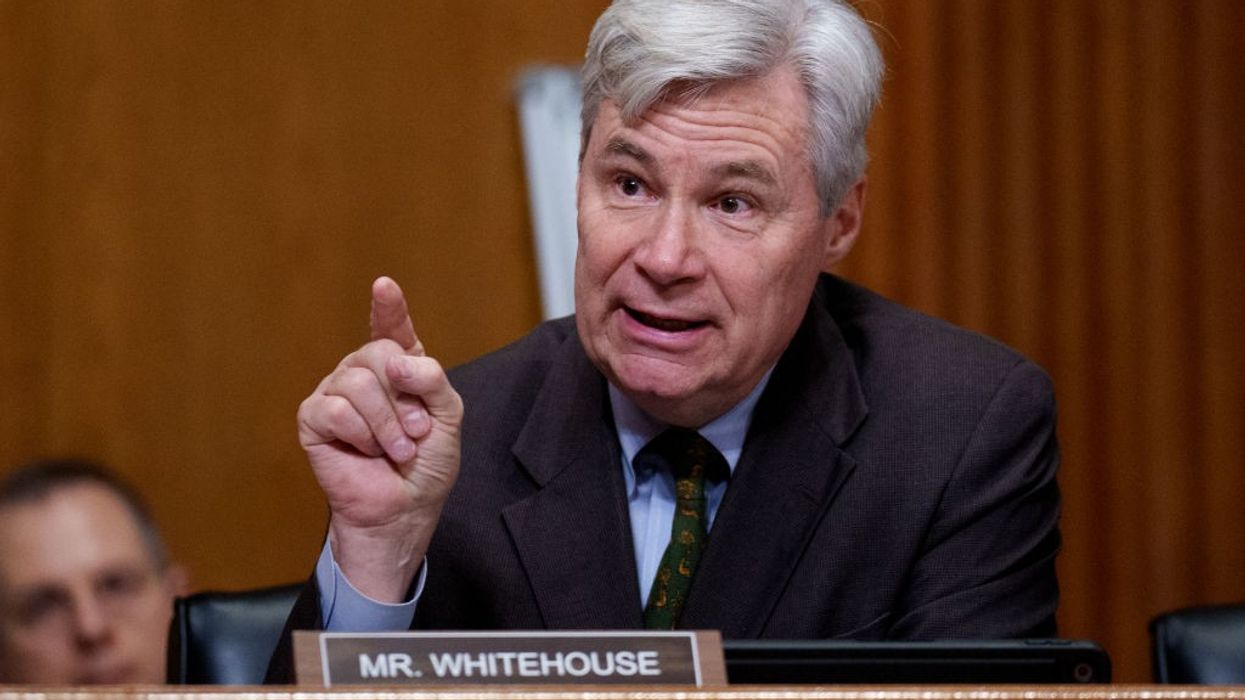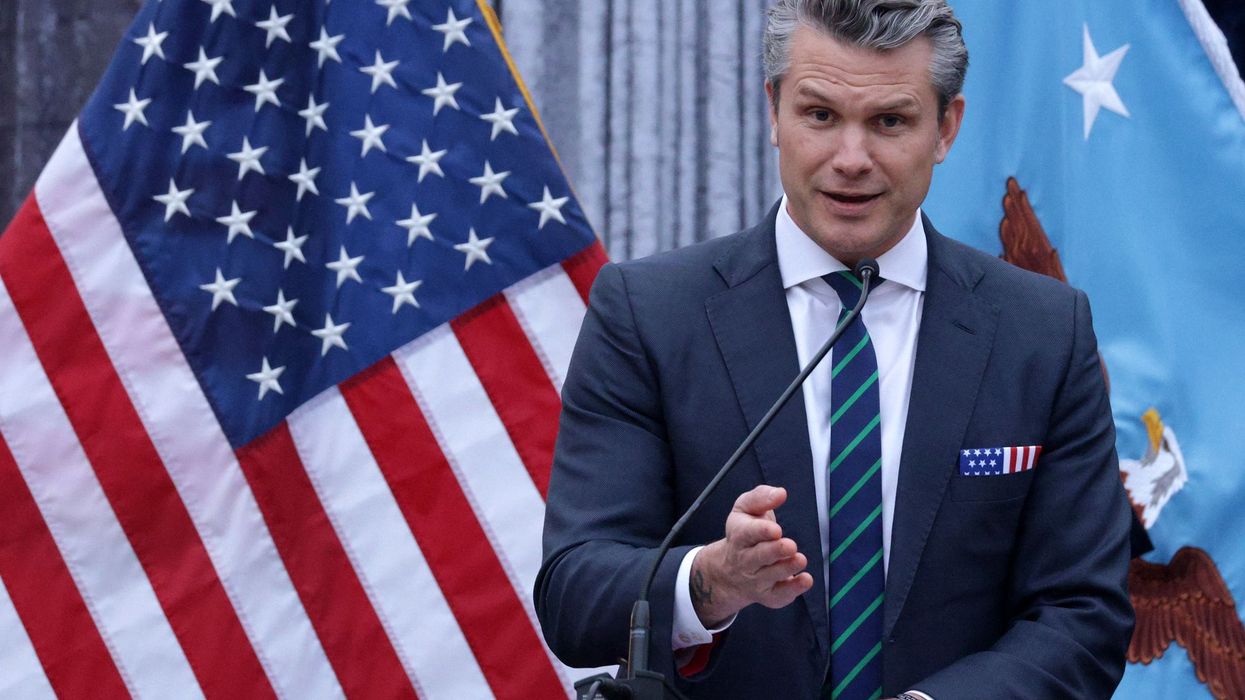November, 23 2009, 01:47pm EDT

Internationally-Renowned Humanitarian Groups Support Challenge To Unconstitutional "Material Support" Law
ACLU Files Friend-Of-The-Court Brief In U.S. Supreme Court
NEW YORK
The
American Civil Liberties Union today filed a friend-of-the-court brief
on behalf of the Carter Center, Human Rights Watch and several other
human rights and humanitarian organizations in a case before the U.S.
Supreme Court challenging the constitutionality of a law that makes it
a crime to provide "material support or resources" to any organization
that the Secretary of State has designated a "foreign terrorist
organization" (FTO). The organizations that joined the brief are
internationally recognized for their efforts to promote peace, further
human rights and alleviate human suffering around the world. According
to the brief, those efforts are imperiled by the vague language of the
material support law, which arguably reaches even speech and advocacy
whose only purpose is to deter future terrorist activity.
"The material support law is so
vague and broad that peace, human rights and aid groups are left
hopelessly guessing whether their constitutionally-protected speech
could land them in jail," said Melissa Goodman, staff attorney with the
ACLU National Security Project. "Cutting off aid to terrorism is
undoubtedly an important government interest, but criminalizing
legitimate peace-building and humanitarian work - including advocacy to
end terrorism and violence - does nothing to further that interest and actually makes it more difficult to achieve."
Under the law, individuals face up
to 15 years in prison for providing "material support" to FTOs even if
they oppose the terrorist activities of the designated group and even
if their work is intended to further entirely peaceful, lawful
objectives. "Material support" is defined broadly to include, among
other things, any "service," "training," "expert advice or assistance,"
or "personnel." The ACLU's filing asserts that "each of these terms is
vague, sweeping, and potentially proscribes a wide range of speech and
advocacy that is protected by the First Amendment."
The brief was joined by nine groups
who emphatically oppose terrorism, but whose peace-making, conflict
resolution, human rights advocacy and aid provision to needy civilians
sometimes requires direct engagement with groups and individuals that
resort to or support violence, including some that are, have been or
might in the future be designated as FTOs. The vague material support
law potentially criminalizes the groups' efforts to convince armed
actors to choose non-violent means to achieve their ends, to support
peace processes or to explain to perpetrators of human rights abuses
their obligations under international law and persuade them to cease
their rights-violating practices. The vague material support law also
has grave implications for the provision of humanitarian aid, disaster
relief and development efforts in conflict zones where designated
groups may operate or even control the area.
"The government should not be in the
business of criminalizing speech that furthers humanitarian ends," said
Steven R. Shapiro, ACLU Legal Director. "No one should face the threat
of prison for exercising their First Amendment rights in order to
further peace, promote human rights and provide humanitarian aid around
the world."
The ACLU filed the brief on behalf
of the Carter Center, Christian Peacemaker Teams, Grassroots
International, Human Rights Watch, International Crisis Group, the
Institute for Conflict Analysis and Resolution at George Mason
University, the Kroc Institute for International Peace Studies at Notre
Dame University, Operation USA and the Peace Appeal Foundation.
In addition to Shapiro and Goodman,
attorneys on the brief are Jameel Jaffer and Larry Schwartztol of the
ACLU National Security Project.
The ACLU's brief is available online at: www.aclu.org/national-security/amicus-brief-carter-center-and-other-humanitarian-groups-support-humanitarian-law-
More about the case, Holder v. Humanitarian Law Project, is at: ccrjustice.org/holder-v-humanitarian-law-project
The American Civil Liberties Union was founded in 1920 and is our nation's guardian of liberty. The ACLU works in the courts, legislatures and communities to defend and preserve the individual rights and liberties guaranteed to all people in this country by the Constitution and laws of the United States.
(212) 549-2666LATEST NEWS
Senate Dems Stop Permitting Talks Over Trump's 'Reckless and Vindictive Assault' on Wind Power
"By sabotaging US energy innovation and killing American jobs, the Trump administration has made clear that it is not interested in permitting reform," said Sens. Sheldon Whitehouse and Martin Heinrich.
Dec 22, 2025
The top Democrats on a pair of key US Senate panels ended negotiations to reform the federal permitting process for energy projects in response to the Trump administration's Monday attack on five offshore wind projects along the East Coast.
Senate Environment and Public Works Committee Ranking Member Sheldon Whitehouse (D-RI) and Energy and Natural Resources Committee Ranking Member Martin Heinrich (D-NM) began their joint statement by thanking the panels' respective chairs, Sens. Shelley Moore Capito (R-W.Va.) and Mike Lee (R-Utah), "for their good-faith efforts to negotiate a permitting reform bill that would have lowered electricity prices for all Americans."
"There was a deal to be had that would have taken politics out of permitting, made the process faster and more efficient, and streamlined grid infrastructure improvements nationwide," the Democrats said. "But any deal would have to be administered by the Trump administration. Its reckless and vindictive assault on wind energy doesn't just undermine one of our cheapest, cleanest power sources, it wrecks the trust needed with the executive branch for bipartisan permitting reform."
Earlier Monday, the US Department of the Interior halted Coastal Virginia Offshore Wind off Virginia, Empire Wind 1 and Sunrise Wind off New York, Revolution Wind off Rhode Island and Connecticut, and Vineyard Wind 1 off Massachusetts, citing radar interference concerns.
Governors and members of Congress from impacted states, including Whitehouse and Senate Minority Leader Chuck Schumer (D-NY), condemned the announcement, with Whitehouse pointing to a recent legal battle over the project that would help power Rhode Island.
"It's hard to see the difference between these new alleged radar-related national security concerns and the radar-related national security allegations the Trump administration lost in court, a position so weak that they declined to appeal their defeat," he said.
This looks more like the kind of vindictive harassment we have come to expect from the Trump administration than anything legitimate.
— Senator Sheldon Whitehouse (@whitehouse.senate.gov) December 22, 2025 at 12:59 PM
Later, he and Heinrich said that "by sabotaging US energy innovation and killing American jobs, the Trump administration has made clear that it is not interested in permitting reform. It will own the higher electricity prices, increasingly decrepit infrastructure, and loss of competitiveness that result from its reckless policies."
"The illegal attacks on fully permitted renewable energy projects must be reversed if there is to be any chance that permitting talks resume," they continued. "There is no path to permitting reform if this administration refuses to follow the law."
Reporting on Whitehouse and Heinrich's decision, the Hill reached out to Capito and Lee's offices, as well as the Interior Department, whose spokesperson, Alyse Sharpe, "declined to comment beyond the administration's press release, which claimed the leases were being suspended for national security reasons."
Lee responded on social media with a gif:
Although the GOP has majorities in both chambers of Congress, Republicans don't have enough senators to get most bills to a final vote without Democratic support.
The Democratic senators' Monday move was expected among observers of the permitting reform debate, such as Heatmap senior reporter Jael Holzman, who wrote before their statement came out that "Democrats in Congress are almost certainly going to take this action into permitting reform talks... after squabbling over offshore wind nearly derailed a House bill revising the National Environmental Policy Act last week."
That bill, the Standardizing Permitting and Expediting Economic Development (SPEED) Act, was pilloried by green groups after its bipartisan passage. It's one of four related pieces of legislation that the House advanced last week. The others are the Mining Regulatory Clarity Act, Power Plant Reliability Act, and Reliable Power Act.
David Arkush, director of the consumer advocacy group's Climate Program, blasted all four bills as "blatant handouts to the fossil fuel and mining industries" that would do "nothing to help American families facing staggering energy costs and an escalating climate crisis."
"We need real action to lower energy bills for American families and combat the climate crisis," he argued. "The best policy response would be to fast-track a buildout of renewable energy, storage, and transmission—an approach that would not just make energy more affordable and sustainable, but create US jobs and bolster competitiveness with China, which is rapidly outpacing the US on the energy technologies of the future.
Instead, Arkush said, congressional Republicans and President Donald Trump "are shamefully pushing legislation that would only exacerbate the energy affordability crisis and further entrench the dirty, dangerous, and unaffordable energy of the past."
Keep ReadingShow Less
War Crime, Murder, or Both? Dems Demand DOJ Probe Into Hegseth Order to Kill Shipwrecked Sailors
"Giving a general order to kill any survivors constitutes a war crime," wrote Reps. Jamie Raskin and Ted Lieu. "Outside of war, the killing of unarmed, helpless men clinging to wreckage in open water is simply murder."
Dec 22, 2025
Making clear that the Trump administration's "entire Caribbean operation," which has killed more than 100 people in boats that the US military has bombed, "appears to be unlawful," two Democrats on a powerful House committee on Monday called on the Department of Justice to investigate one particular attack that's garnered accusations of a war crime—or murder.
House Judiciary Committee Ranking Member Jamie Raskin (D-Md.) and Rep. Ted Lieu (D-Calif.) wrote to Attorney General Pam Bondi four weeks after it was reported that in the military's first strike on a boat on September 2, Defense Secretary Pete Hegseth ordered service members to "kill everybody"—prompting a second "double-tap" strike to kill two survivors of the initial blast.
A retired general, United Nations experts, and former top military legal advisers are among those who have warned that Hegseth and the service members directly involved in the strike—as well as the other attacks on more than two dozen boats in the Caribbean and eastern Pacific—may be liable for war crimes or murder.
Raskin and Lieu raised that concern directly to Bondi, writing: "Deliberately targeting incapacitated individuals constitutes a clear violation of the Department of Defense’s Law of War Manual, which expressly forbids attacks on persons rendered helpless by shipwreck. Such conduct would trigger criminal liability under the War Crimes Act if the administration claims it is engaged in armed conflict, or under the federal murder statute if no such conflict exists."
The administration has insisted it is attacking the boats as part of an effort to stop drug trafficking out of Venezuela, and has claimed the US is in an armed conflict with drug cartels there, though international and domestic intelligence agencies have not identified the country as a significant source any drugs that flow into the US. As President Donald Trump has ordered the boat strikes, the administration has also been escalating tensions with Venezuela by seizing oil tankers, claiming to close its airspace, and demanding that President Nicolás Maduro leave power.
Critics from both sides of the aisle in Congress have questioned the claim that the bombed boats were a threat to the US, and Raskin and Lieu noted that the vessel attacked on September 2 in particular appeared to pose no threat, as it was apparently headed to Suriname, "not the United States, at the time it was destroyed."
"Deliberately targeting incapacitated individuals constitutes a clear violation of the Department of Defense’s Law of War Manual, which expressly forbids attacks on persons rendered helpless by shipwreck."
"Congress has never authorized military force against Venezuela; a boat moving towards Suriname does not pose a clear and present danger to the United States; and the classified legal memoranda the Trump administration has offered us to justify the attacks are entirely unpersuasive," wrote the lawmakers.
Raskin and Lieu emphasized that Hegseth's explanations of the September 2 strike in particular have been "shifting and contradictory."
"Secretary Hegseth has variously claimed that he missed the details of the September 2 strike because of the 'fog of war,' and that he actually left the room before any explicit order was given to kill the survivors," they wrote. "Later reporting suggests that he gave a general order to kill all passengers aboard ahead of the strike but delegated the specific order to kill survivors to a subordinate."
The facts that are known about the strike, as well as Hegseth's muddled claims, warrant a DOJ investigation, the Democrats suggested.
"Giving a general order to kill any survivors constitutes a war crime," they wrote. "Similarly, carrying out such an order also constitutes a war crime, and the Manual for Courts-Martial explicitly provides that 'acting pursuant to orders' is no defense 'if the accused knew the orders to be unlawful.' Outside of war, the killing of unarmed, helpless men clinging to wreckage in open water is simply murder. The federal criminal code makes it a felony to commit murder within the 'special maritime and territorial jurisdiction of the United States,' which is defined to include the 'high seas.' It is also a federal crime to conspire to commit murder."
Raskin and Lieu also emphasized that two memos from the DOJ's Office of Legal Counsel (OLC) "do not—and cannot—provide any legal protection for the secretary’s conduct."
A 2010 OLC memo said the federal murder statute does not apply "when the target of a military strike is an enemy combatant in a congressionally authorized armed conflict," they noted. "In stark contrast, in the case of the Venezuelan boats, Congress has not authorized military force of any kind."
A new classified memo also suggested that “personnel taking part in military strikes on alleged drug trafficking boats in Latin America would not be exposed to future prosecution," and claimed that "the president’s inherent constitutional authority in an undeclared 'armed conflict' will shield the entire chain of command from criminal liability."
The Democrats wrote, "Experts in criminal law, constitutional law, and the law of armed conflict find this sweeping, unsubstantiated claim implausible, at best."
They also noted that even the author of the George W. Bush administration's infamous "Torture Memo," conservative legal scholar John Woo, has said Hegseth's order on September 2 was clearly against the law.
"Attorney General Bondi, even those who condoned and defended torture in the name of America are saying that the Trump administration has violated both federal law and the law of war," wrote Raskin and Lieu. "We urge you to do your duty as this country’s chief law enforcement officer to investigate the secretary’s apparent and serious violations of federal criminal law."
Keep ReadingShow Less
'Exactly What We Don't Need': Trump Bashed for Naming New Class of Warships After Himself
The reported move came just days after Trump added his name to the John F. Kennedy Center for the Performing Arts.
Dec 22, 2025
The Wall Street Journal on Monday reported that President Donald Trump will announce that the US Navy is building a new class of warship that will be named after him.
According to the Journal, the president is expected to reveal that the Navy is building "a new 'Trump-class' battleship, which will become the centerpiece of the president’s vision for a new 'Golden Fleet.'"
The Journal noted that Trump in the past has complained about the aesthetic look of US warships, which he has described as "terrible-looking." Sources told the Journal that the new ship will "be an upgrade to the Navy’s Arleigh Burke-class destroyers, which are the workhorse of the current fleet and which Trump has compared unfavorably to rival navies."
Mark Montgomery, a retired rear admiral who currently serves as a senior director at the Foundation for Defense of Democracies, dumped on Trump's "Golden Fleet" plans in an interview with the Journal, describing the ships as "exactly what we don’t need" and accusing Trump's underlings of being "focused on the president’s visual that a battleship is a cool-looking ship."
New York Times columnist Jamelle Bouie echoed Montgomery's criticisms of the project, which he speculated was being done for entirely frivolous reasons.
"This just has me thinking about how so much of this government and the movement around it is purely a matter of aesthetics," he wrote on Bluesky. "Is there a strategic reason for produce a new warship? Maybe. But my hunch is that this is happening because the president thinks it will look cool."
CNBC's Carl Quintanilla observed that the Trump-branded warships were just the latest thing that the president has slapped his name on, as in recent months he has also announced the creation of the "TrumpRx" prescription drug website and the "Trump Gold Card," while also adding his name to the John F. Kennedy Center for the Performing Arts.
Democratic political strategist Jim Manley reacted with horror to Trump naming American military equipment after himself.
"My God," he wrote on Bluesky. "Well, that seals the deal. If House and Senate appropriators agree to this—burn it all down."
Keep ReadingShow Less
Most Popular


